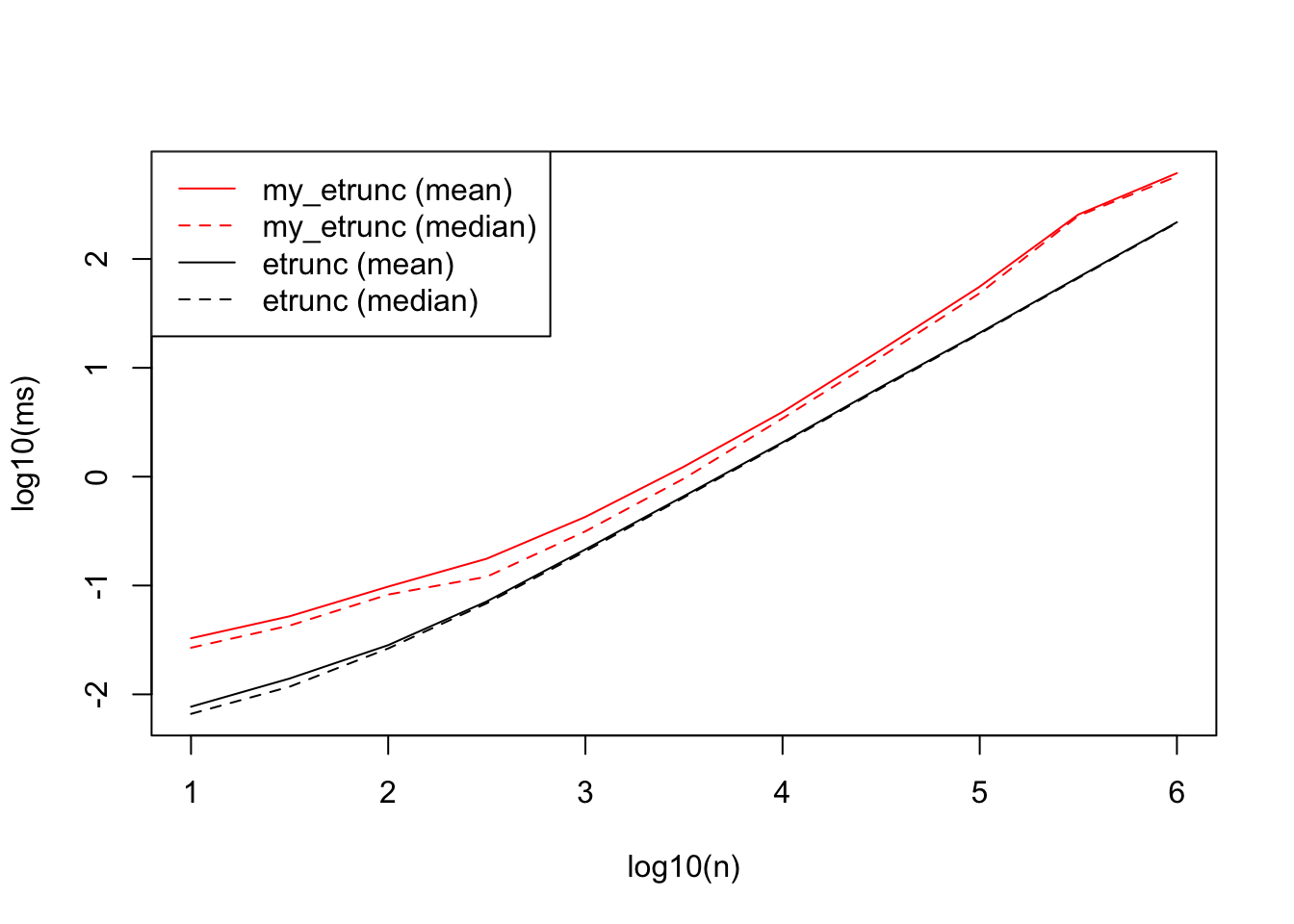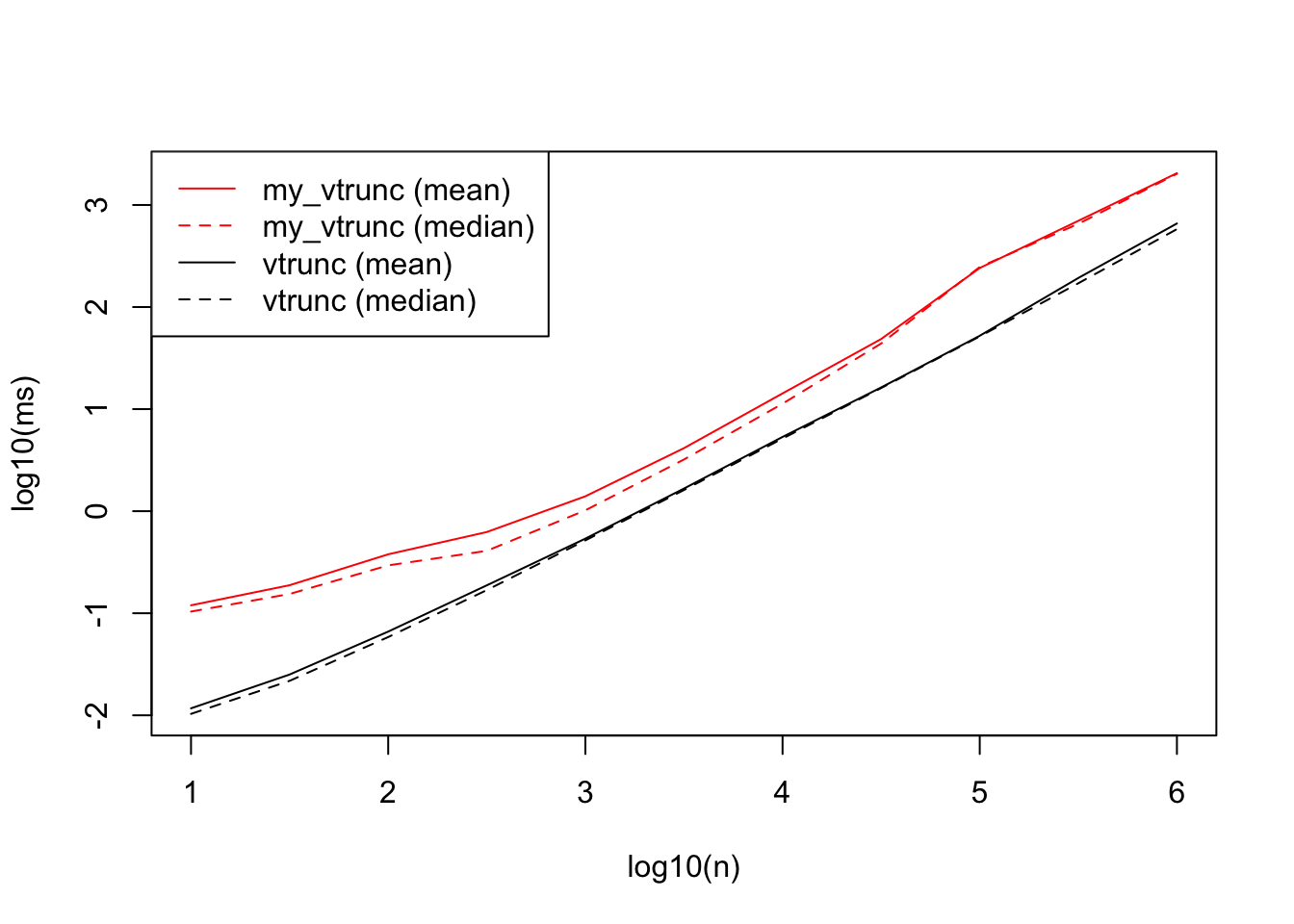Benchmarking my_etruncnorm
Jason Willwerscheid
1/26/2019
Last updated: 2019-01-28
workflowr checks: (Click a bullet for more information)-
✔ R Markdown file: up-to-date
Great! Since the R Markdown file has been committed to the Git repository, you know the exact version of the code that produced these results.
-
✔ Environment: empty
Great job! The global environment was empty. Objects defined in the global environment can affect the analysis in your R Markdown file in unknown ways. For reproduciblity it’s best to always run the code in an empty environment.
-
✔ Seed:
set.seed(20180714)The command
set.seed(20180714)was run prior to running the code in the R Markdown file. Setting a seed ensures that any results that rely on randomness, e.g. subsampling or permutations, are reproducible. -
✔ Session information: recorded
Great job! Recording the operating system, R version, and package versions is critical for reproducibility.
-
Great! You are using Git for version control. Tracking code development and connecting the code version to the results is critical for reproducibility. The version displayed above was the version of the Git repository at the time these results were generated.✔ Repository version: 5e3a6c1
Note that you need to be careful to ensure that all relevant files for the analysis have been committed to Git prior to generating the results (you can usewflow_publishorwflow_git_commit). workflowr only checks the R Markdown file, but you know if there are other scripts or data files that it depends on. Below is the status of the Git repository when the results were generated:
Note that any generated files, e.g. HTML, png, CSS, etc., are not included in this status report because it is ok for generated content to have uncommitted changes.Ignored files: Ignored: .DS_Store Ignored: .Rhistory Ignored: .Rproj.user/ Ignored: docs/.DS_Store Ignored: docs/figure/.DS_Store Untracked files: Untracked: analysis/gd_notes.Rmd Untracked: code/pathways.R Untracked: data/lowrank/ Untracked: data/tmp.rds Untracked: data/tmp2.rds
Expand here to see past versions:
Introduction
I benchmark the rewritten my_etruncnorm and my_vtruncnorm against their counterparts in package truncnorm. I expect truncnorm to be a bit faster since it calls into C, but my hope is that the difference isn’t too noticeable.
devtools::load_all("~/Github/ashr")Loading ashrlibrary(truncnorm)
do_benchmark <- function(ns, FUN1, FUN2) {
means <- matrix(0, nrow = 2, ncol = length(ns))
medians <- matrix(0, nrow = 2, ncol = length(ns))
for (i in 1:length(ns)) {
times = floor(10000000 / ns[i])
res <- microbenchmark::microbenchmark(FUN1(a, b),
FUN2(a, b),
setup = {
a = -abs(rnorm(ns[i]))
b = abs(rnorm(ns[i]))
},
times = times,
unit = "ms")
res <- summary(res)
means[, i] <- res$mean
medians[, i] <- res$median
}
return(list(means = means, medians = medians))
}etruncnorm
ns <- 10^seq(1, 6, by = 0.5)
res <- do_benchmark(ns, etruncnorm, my_etruncnorm)
ymin <- log10(min(c(res$means, res$medians)))
ymax <- log10(max(c(res$means, res$medians)))
plot(log10(ns), log10(res$means[2, ]), type = 'l', lty = 1, col = "red",
xlab = "log10(n)", ylab = "log10(ms)", ylim = c(ymin, ymax))
lines(log10(ns), log10(res$medians[2, ]), col = "red", lty = 2)
lines(log10(ns), log10(res$means[1, ]), col = "black", lty = 1)
lines(log10(ns), log10(res$medians[1, ]), col = "black", lty = 2)
legend("topleft", legend = c("my_etrunc (mean)", "my_etrunc (median)",
"etrunc (mean)", "etrunc (median)"),
lty = c(1, 2, 1, 2), col = c("red", "red", "black", "black"))
Expand here to see past versions of etruncnorm-1.png:
| Version | Author | Date |
|---|---|---|
| 5e3a6c1 | Jason Willwerscheid | 2019-01-26 |
vtruncnorm
res <- do_benchmark(ns, vtruncnorm, my_vtruncnorm)
ymin <- log10(min(c(res$means, res$medians)))
ymax <- log10(max(c(res$means, res$medians)))
plot(log10(ns), log10(res$means[2, ]), type = 'l', lty = 1, col = "red",
xlab = "log10(n)", ylab = "log10(ms)", ylim = c(ymin, ymax))
lines(log10(ns), log10(res$medians[2, ]), col = "red", lty = 2)
lines(log10(ns), log10(res$means[1, ]), col = "black", lty = 1)
lines(log10(ns), log10(res$medians[1, ]), col = "black", lty = 2)
legend("topleft", legend = c("my_vtrunc (mean)", "my_vtrunc (median)",
"vtrunc (mean)", "vtrunc (median)"),
lty = c(1, 2, 1, 2), col = c("red", "red", "black", "black"))
Expand here to see past versions of vtruncnorm-1.png:
| Version | Author | Date |
|---|---|---|
| 5e3a6c1 | Jason Willwerscheid | 2019-01-26 |
Session information
sessionInfo()R version 3.4.3 (2017-11-30)
Platform: x86_64-apple-darwin15.6.0 (64-bit)
Running under: macOS High Sierra 10.13.6
Matrix products: default
BLAS: /Library/Frameworks/R.framework/Versions/3.4/Resources/lib/libRblas.0.dylib
LAPACK: /Library/Frameworks/R.framework/Versions/3.4/Resources/lib/libRlapack.dylib
locale:
[1] en_US.UTF-8/en_US.UTF-8/en_US.UTF-8/C/en_US.UTF-8/en_US.UTF-8
attached base packages:
[1] stats graphics grDevices utils datasets methods base
other attached packages:
[1] truncnorm_1.0-8 ashr_2.2-27
loaded via a namespace (and not attached):
[1] Rcpp_1.0.0 compiler_3.4.3 git2r_0.21.0
[4] workflowr_1.0.1 R.methodsS3_1.7.1 R.utils_2.6.0
[7] iterators_1.0.10 tools_3.4.3 testthat_2.0.1
[10] digest_0.6.18 etrunct_0.1 evaluate_0.12
[13] memoise_1.1.0 lattice_0.20-35 rlang_0.3.0.1
[16] Matrix_1.2-14 foreach_1.4.4 microbenchmark_1.4-6
[19] commonmark_1.4 yaml_2.2.0 parallel_3.4.3
[22] mvtnorm_1.0-7 xfun_0.4 withr_2.1.2.9000
[25] stringr_1.3.1 roxygen2_6.0.1.9000 xml2_1.2.0
[28] knitr_1.21.6 devtools_1.13.4 rprojroot_1.3-2
[31] grid_3.4.3 R6_2.3.0 survival_2.41-3
[34] rmarkdown_1.11 multcomp_1.4-8 mixsqp_0.1-93
[37] TH.data_1.0-8 magrittr_1.5 whisker_0.3-2
[40] splines_3.4.3 backports_1.1.2 codetools_0.2-15
[43] htmltools_0.3.6 MASS_7.3-48 assertthat_0.2.0
[46] sandwich_2.4-0 stringi_1.2.4 doParallel_1.0.14
[49] pscl_1.5.2 SQUAREM_2017.10-1 zoo_1.8-1
[52] R.oo_1.21.0 This reproducible R Markdown analysis was created with workflowr 1.0.1